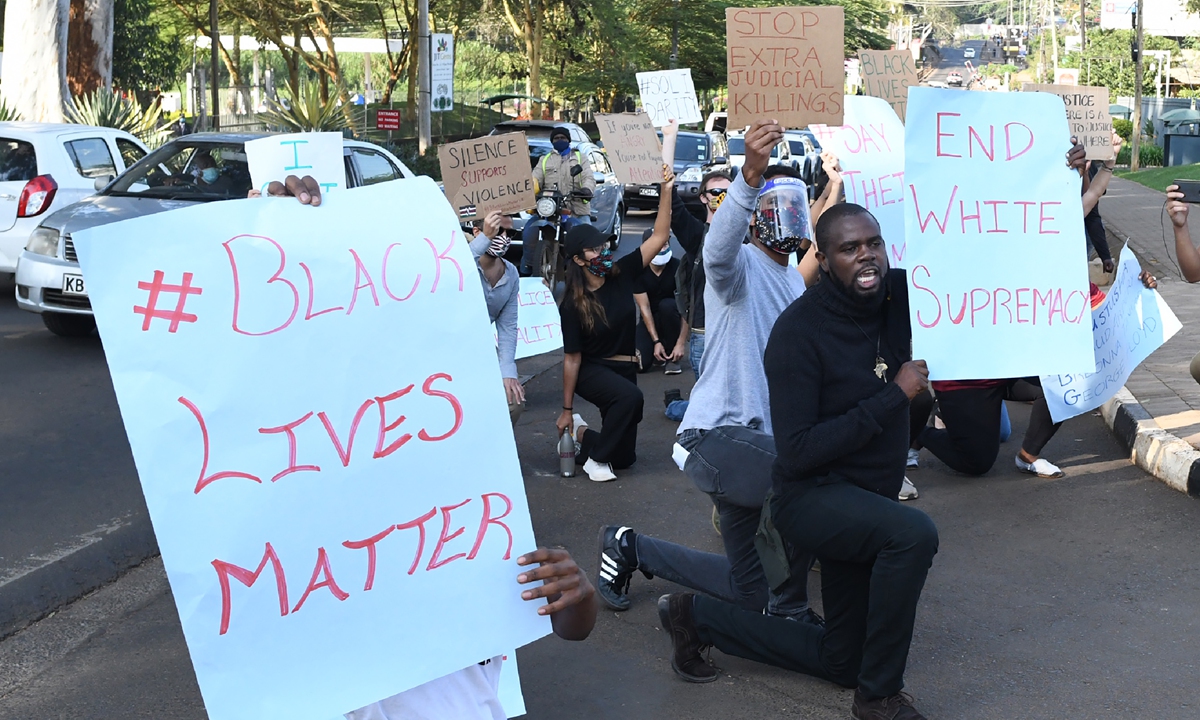Floyd murder repels African countries
By Joyce Chimbi Source:Global Times Published: 2020/6/4 14:29:32

Protesters kneel during a demonstration in solidarity with the global Black Lives Matter movement as they protest over police brutality and white supremacy in the US outside the US Embassy in Nairobi on June 2, 2020. Photo: AFP
Africa has reacted to the killing of an unarmed African-American man by a white police officer in the US with utter outrage.
How George Floyd's life was taken away is an image that speaks volumes. It says that this shocking level of police brutality towards a minority group is not an isolated incident, and that had this incident not been caught on camera, the officer would have literally gotten away with murder.
Equally terrifying is the fact that there were three other officers at the scene who found no fault with the brutal manner in which the life of a black man was cruelly taken away.
Through various twitter hashtags such as #BlackLivesMatter and #JusticeForGeorgeFloyd, Africans from all walks of life have continued to express their anger and disgust on social media over this killing, and with the manner in which events have unfolded since Floyd's death on May 25.
It is unfathomable that the worst punishment so far meted on the three other officers at the scene of this heinous crime, is that they were fired from their jobs.
This incident has exposed America's underbelly of racial inequalities and the truth that black people are killed by law enforcement in despicably and disproportionately high numbers. Against this backdrop, Africa has expressed an outpouring of anger over this highest level of injustice that seems to go on unabated.
South Africa's ruling African National Congress party has criticized the US society for placing such a low value on black lives. The African Union (AU) Chairperson Cyril Ramaphosa has called the death of Floyd a murder.
According to Ramaphosa, the AU "shares the anger of millions in the United States and across the world." He emphasized, "Global solidarity demands that we also stand as one against all forms of racism and intolerance."
The Forum of Former Heads of State and Government has urged countries across the African continent to "raise a strong protest" over Floyd's death.
A statement released by former Beninese president Nicephore Soglo reads in part: "What level of cruelty must you reach that the entire world finally wakes up and manifests its indignation. Enough is enough."
Used to be on the receiving end for various human rights abuses including police brutality, Africans are pointing to a double standard over US police treatment of the black minority community.
In a strongly worded statement on Friday, the AU Commission Chairperson Moussa Faki Mahamat called for the, "rejection of the continuing discriminatory practices against black citizens."
This comment echoed other statements released from US embassies or ambassadors in various African countries including Democratic Republic of Congo, Zimbabwe, Kenya, Uganda and Tanzania. Importantly, these statements are a telling departure from the past as US embassies overseas do not comment on domestic affairs in the US, therein showing that the situation has reached a tipping point. And, this further points to brewing diplomatic fallout over such blatant abuse of human rights.
This far, there have been demonstrations in Liberia at the US Embassy to the country and street protests in Kenya and Nigeria. Similar gatherings were not approved in many other African cities because of COVID-19.
Considered a "beacon of democracy" and a superpower, the US may well lose its moral high ground and legitimacy to monitor and condemn so-called human right abuses in other countries, especially in Africa.
Experts on human rights and civil society movements in Africa now say that the death of Floyd personifies police violence and systemic racism. Many now consider the US to be at a crossroads, a country in crisis, and turning on its own people as racial tensions reach an all-time high.
It defies belief that today, the US remains entangled in racial violence and discrimination against minorities, and this is an indelible stain on a country that developing countries have looked up to for support for many years.
It is now clear as day that Malcolm's X speech in 1964 at the Organization of African Unity, now African Union, urging his "African brothers and sisters" to be aware of the discrimination faced by African-Americans lives long on 56 years later.
The author is a Kenya-based journalist. opinion@globaltimes.com.cn
RELATED ARTICLES:
Posted in: VIEWPOINT